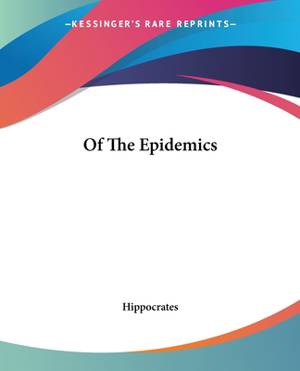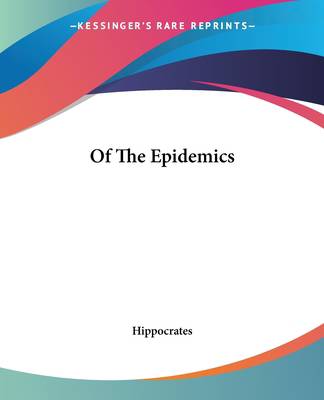
- Afhalen na 1 uur in een winkel met voorraad
- Gratis thuislevering in België vanaf € 30
- Ruim aanbod met 7 miljoen producten
- Afhalen na 1 uur in een winkel met voorraad
- Gratis thuislevering in België vanaf € 30
- Ruim aanbod met 7 miljoen producten
Zoeken
Omschrijving
""Of The Epidemics"" is a collection of medical writings by the ancient Greek physician Hippocrates, who is often referred to as the father of modern medicine. The book is a compilation of observations and theories about the nature, causes, and treatments of epidemics that plagued ancient Greece. Hippocrates believed that epidemics were caused by natural factors such as climate, water, and food, rather than supernatural or divine forces. He also emphasized the importance of hygiene, diet, and exercise in preventing and treating diseases. The book is divided into seven parts, each of which describes a different epidemic that Hippocrates encountered and treated. He provides detailed accounts of the symptoms, progression, and outcomes of each epidemic, as well as the treatments he used. Although some of the medical practices described in ""Of The Epidemics"" may seem outdated or ineffective by modern standards, it is still considered a valuable historical document and a testament to the pioneering work of Hippocrates in the field of medicine.Case i. Charion, who was lodged at the house of Demaenetus, contracted a fever from drinking. Immediately he had a painful heaviness of the head; did not sleep; bowels disordered, with thin and somewhat bilious discharges. On the third day, acute fever; trembling of the head, but especially of the lower lip; after a little time a rigor, convulsions; he was quite delirious; passed the night uncomfortably. On the fourth, quiet, slept little, talked incoherently. On the fifth, in pain; all the symptoms exacerbated; delirium; passed the night uncomfortably; did not sleep. On the sixth, in the same state. On the seventh had a rigor, acute fever, sweated all over his body; had a crisis.This scarce antiquarian book is a facsimile reprint of the old original and may contain some imperfections such as library marks and notations. Because we believe this work is culturally important, we have made it available as part of our commitment for protecting, preserving, and promoting the world's literature in affordable, high quality, modern editions, that are true to their original work.
Specificaties
Betrokkenen
- Auteur(s):
- Uitgeverij:
Inhoud
- Aantal bladzijden:
- 48
- Taal:
- Engels
Eigenschappen
- Productcode (EAN):
- 9781419137792
- Verschijningsdatum:
- 17/06/2004
- Uitvoering:
- Paperback
- Formaat:
- Trade paperback (VS)
- Afmetingen:
- 188 mm x 235 mm
- Gewicht:
- 104 g

Alleen bij Standaard Boekhandel
+ 48 punten op je klantenkaart van Standaard Boekhandel
Beoordelingen
We publiceren alleen reviews die voldoen aan de voorwaarden voor reviews. Bekijk onze voorwaarden voor reviews.











